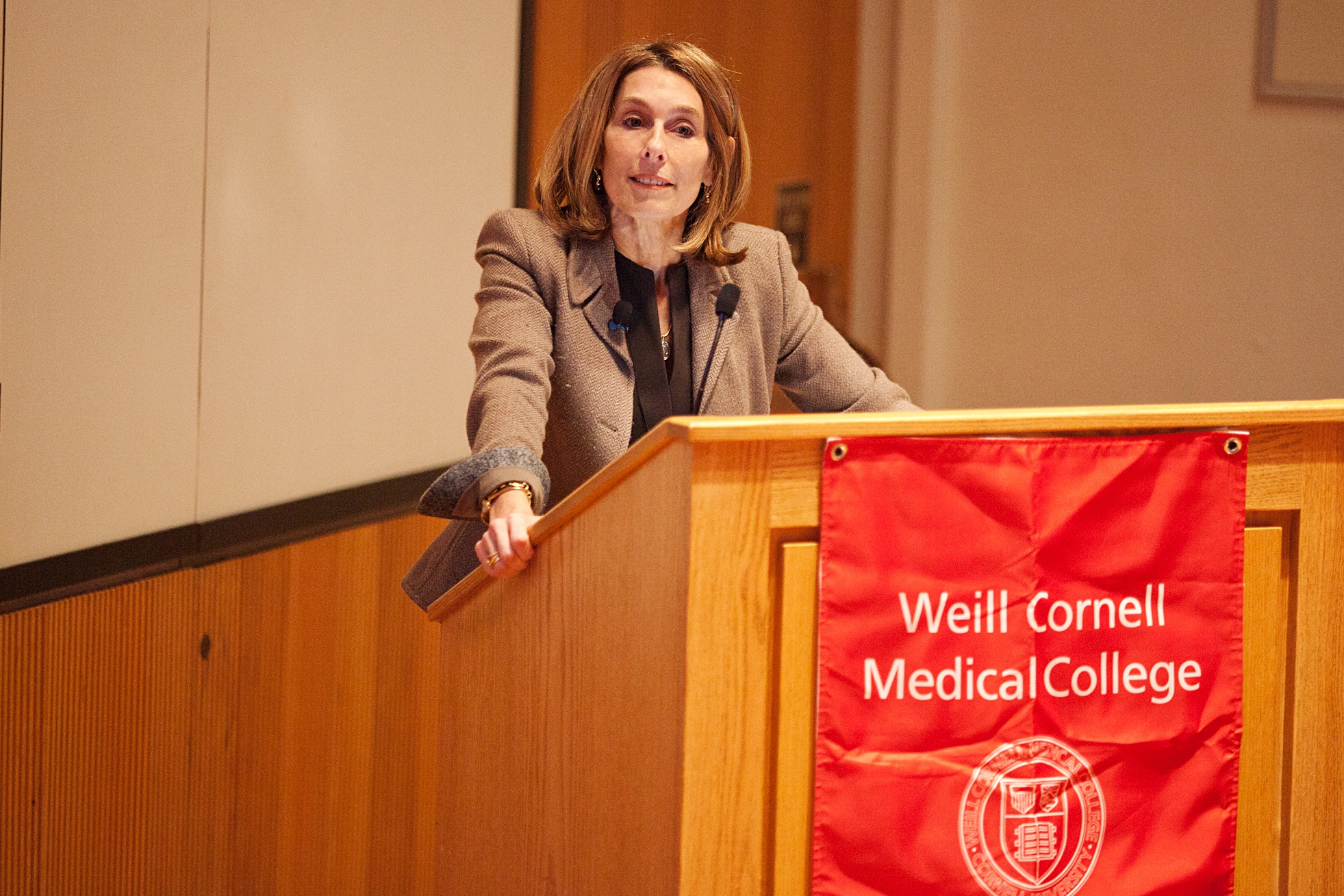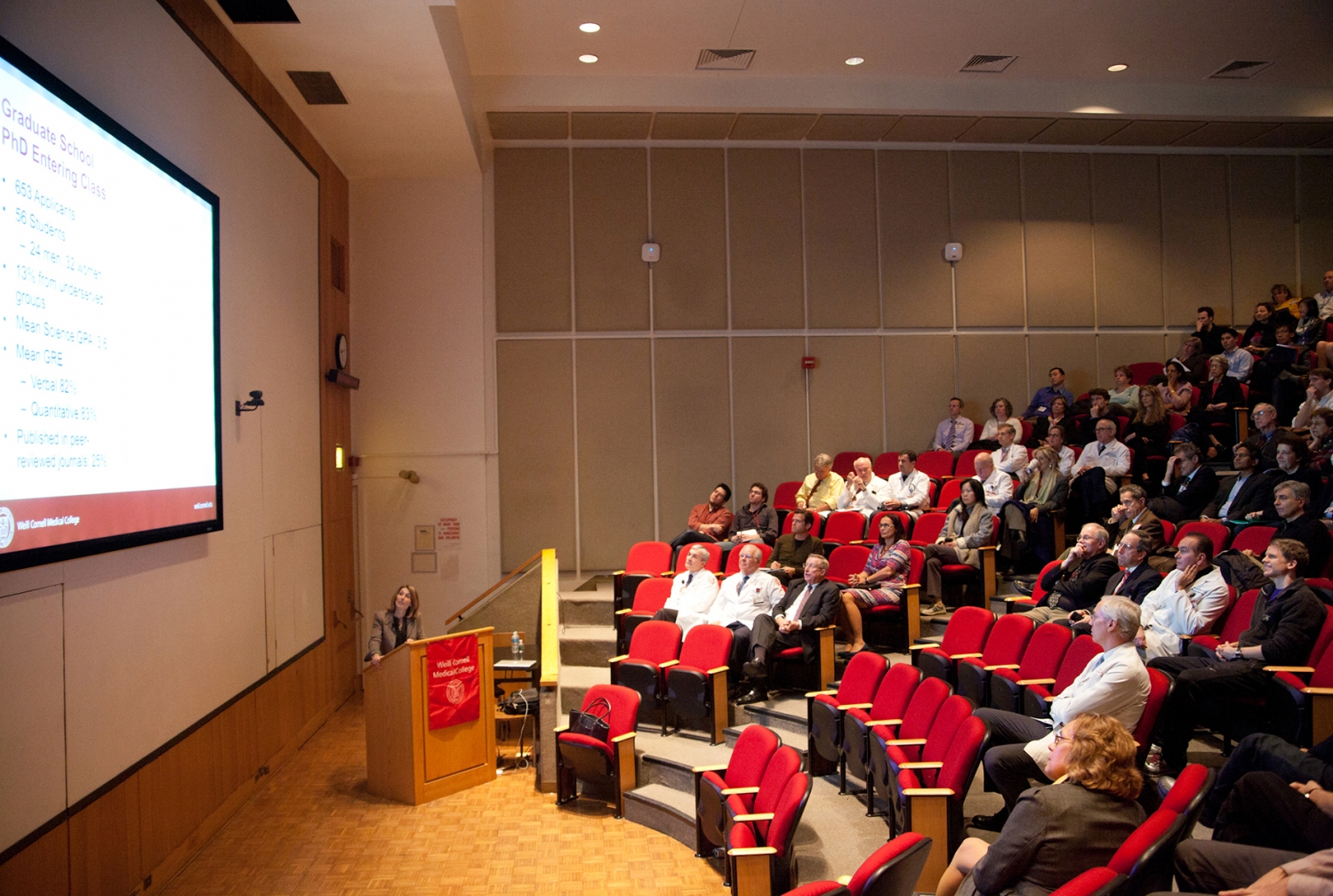Academic medical centers face an uncertain future, especially as federal research funds continue to shrink, but Weill Cornell Medical College is poised not only to thrive, but to lead the way in providing excellent education, research and clinical care.
In Dr. Laurie H. Glimcher's annual State of the Medical College address — her second as the Stephen and Suzanne Weiss Dean of Weill Cornell Medical College — she said that Weill Cornell is positioned for a prosperous future by evolving with the ever-changing health care environment.

Dr. Laurie H. Glimcher delivers annual State of the Medical College address on Dec. 4. Photo credit: Ira Fox
Standing in front of a crowded Uris Auditorium on Dec. 4, Dr. Glimcher reviewed the medical college's accomplishments over the past year and shared her goals for 2014 — among them, establishing a new medical school curriculum, strengthening the biomedical research enterprise, and expanding Weill Cornell's footprint in clinical care.
"I think that we have made some significant progress," Dr. Glimcher said. "I think we are already on our way to putting many of these agendas into action here at Weill Cornell — thanks to the help and commitment and passion of all of you."
While Weill Cornell is in the black, it's not immune to the challenges facing all academic medical centers, she said. Research funding from the National Institutes of Health has plummeted 20 percent over the past decade, with the $1.7 billion in cuts enacted this spring through sequestration inflicting even greater pain on scientists who can no longer obtain research grants. It's clear, Dr. Glimcher said, that the academic medical centers can no longer rely solely on traditional funding streams for their work.
To counteract Washington belt-tightening, Dr. Glimcher said the medical college will continue to seek philanthropy and build public-private partnerships to spur advances in each facet of Weill Cornell's mission.
"We need more resources because we have big plans in medical education, in research and in clinical expansion," she said.
Reimagining Medical School Curriculum
To prepare the next generation of physicians and scientists, Weill Cornell faculty have spent the last few years rewriting the medical school curriculum, which was last updated in 1996. Leadership will pilot the new educational blueprint — which will accelerate students' access to the clinic by a semester — in January with full roll-out next fall.
"Our curriculum has trained our students well, but needed to be reinvigorated and altered to fit the very rapidly changing health care environment and very rapidly changing research environment," Dr. Glimcher said.
This reform will enhance Weill Cornell's education program, which continues to attract the best and brightest students, Dr. Glimcher said. The diverse Class of 2017 — 19 percent of its students are from groups underrepresented in medicine — has the highest mean Medical College Admission Test score ever recorded at the medical college, and boasts 18 M.D.-Ph.D. students. At Weill Cornell Medical College in Qatar, nine of the 41 students in this year's entering class have successfully completed the medical college's pre-pre-med and pre-med programs.
The Weill Cornell Graduate School of Medical Sciences, led by new Dean Dr. Gary Koretzky, accepted 56 students from 653 applicants. Some 13 percent are from groups underrepresented in medicine. In the Tri-Institutional M.D.-Ph.D. program, ranked first among M.D.-Ph.D. programs nationally for diversity, 24 percent of students enrolled in the program come from groups underrepresented in medicine. Last winter the program received a perfect score in its NIH Medical Scientist Training Program renewal grant application.
Expanding Weill Cornell's Biomedical Enterprise
Much of the medical college's successes are entwined with the prowess of its faculty, Dr. Glimcher said. Over the past two years, Weill Cornell has added 32 leading scientists to its ranks — among them nine senior recruits — who together will advance basic, clinical and translational research along with clinical care at the medical college.
She highlighted the backgrounds of three new leaders at Weill Cornell — Dr. Koretzky, who is also senior associate dean for research, Dr. Augustine Choi, chairman of the Department of Medicine, and Dr. Hugh Hemmings, chairman of the Department of Anesthesiology.
Weill Cornell is fortunate to already have a first-rate biomedical enterprise, Dr. Glimcher said, which will be enriched with the opening of the Belfer Research Building next month and efforts to recruit more of the world's leading lights — all possible due to the generosity of Weill Cornell benefactors.
To advance its mission of bringing the most advanced care to patients, Weill Cornell has established nearly a dozen interdisciplinary centers and institutes — some in partnership with NewYork-Presbyterian Hospital — that transform the paradigm for high-impact biomedical research. These hubs — the Cancer Center at Weill Cornell and NewYork-Presbyterian Hospital, the Feil Family Brain and Mind Research Institute and the Institute for Precision Medicine among them — are charged with fostering collaboration between basic and translational scientists and clinicians to accelerate the application of groundbreaking discoveries made in the lab to innovative therapies for patients.
But drug development cannot be done in a vacuum. It is crucial to get the private sector involved to help ensure that findings in academic labs are translated into treatments, Dr. Glimcher said.
"Academe is very good at biology and target discovery and proof of principle," she said. "We're not so great in medicinal chemistry and that's where pharma is very strong."
To that end, Weill Cornell, Memorial Sloan-Kettering Cancer Center and The Rockefeller University joined forces with pharmaceutical company Takeda this fall in forming the Tri-Institutional Therapeutics Discovery Institute, which is tasked with expediting early-stage drug discovery into innovative treatments and therapies. The Tri-I TDI has just selected Dr. Michael Foley as director, and Takeda's scientists will arrive in March.
As the Tri-I TDI embarks on its work, Larry Schlossman, managing director of BioPharma Alliances and Research Collaborations at Weill Cornell, continues to develop partnerships between pharmaceutical companies and the medical college.
Providing Top-Notch Clinical Care
These initiatives would be for naught were they not infused with Weill Cornell's primary mission: "to keep the patient at the center of everything we do," Dr. Glimcher said. Discoveries made by basic scientists are increasingly being applied by physicians as Weill Cornell expands its clinical presence.
In March, the medical college and the Weill Cornell Physician Organization opened a new, comprehensive medical practice on Manhattan's West Side, offering imaging, primary care and high-demand specialty services to children and adults — all under one roof. And in July, when New York Downtown Hospital merged with NewYork-Presbyterian Hospital to become NewYork-Presbyterian/Lower Manhattan; the 140 physicians on staff became credentialed members of the Weill Cornell faculty, as well as members of the physician organization. Both practices create a bridge between Weill Cornell's world-class physicians on the Upper East Side with areas in Manhattan that previously had limited access to the high-quality patient care that the academic medical center provides.
"I think Weill Cornell and NewYork-Presbyterian Hospital are known for providing absolutely outstanding clinical care, both here and abroad," Dr. Glimcher said.
These efforts in clinical care, medical education and biomedical research continue to occur in partnership with Cornell University, CUNY Hunter College and Houston Methodist. And Weill Cornell's global initiatives in places like Weill Bugando in Tanzania, Gheskio in Haiti and Weill Cornell Medical College in Qatar remain strong, Dean Glimcher said.
"I think the experiment in Qatar started by Dean [Antonio M.] Gotto has really proven itself to be a success in terms of the quality of young people we are training to be physicians," she said.
The strength of Weill Cornell's mission is what sets Weill Cornell apart, Dr. Glimcher said, and is what will keep the medical college thriving.
"I want to thank all of you, faculty, staff, administration, students for your commitment to and passion for this really wonderful institution," she said. "It's been a great privilege to work with all of you over the last year, and I think the best is yet to come."

